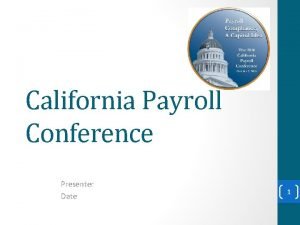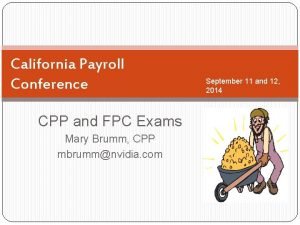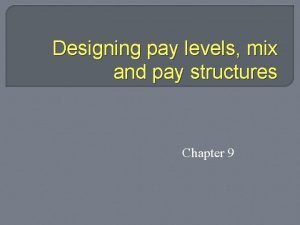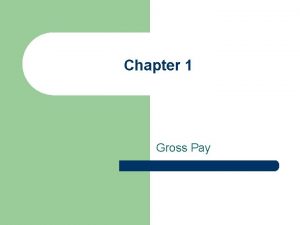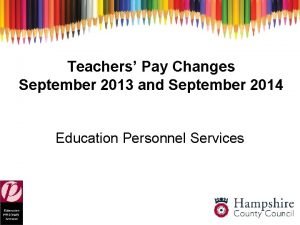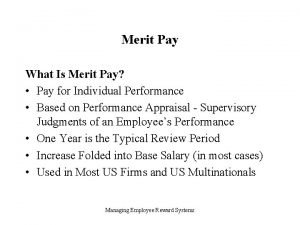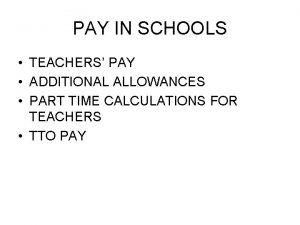Leadership Pay Conference Changes to Teachers Pay 2014














- Slides: 14

Leadership Pay Conference Changes to Teachers Pay 2014 Wednesday 4 th June 2014 Facilitators: Mark Nelson – Schools HR Hans Formella – Ealing NAHT

PROGRAMME FOR THE SESSION • Presentation on the changes – (40 mins) • Q & A on Presentation (10 mins) • Case Study 1 – “Setting the pay for your Head” – Group Work (40 mins) • Coffee Break (10 mins) • Feedback from Case Study 1 (30 mins) • Case Study 2 – “Pay rise or no Pay Rise ? ” – Group Work (40 mins) • Feedback from Case Study 2 (30 mins) • Summing up and Close – (10 mins)

Changes to the School Teachers’ Pay & Conditions Document 2014 • How we got here • STRB remit to include leadership pay, allowances, safeguarding & non pay conditions • STRB report Feb 2014 – consultation and Sec of State accepts recommendations • Draft STPCD issued at end of March • Further period of consultation in May • New STPCD in September 2014 • STRB observation that schools (GBs? ) will need access to: • Specialist HR advice • Support from a professional clerk • Relevant benchmarking data

Changes to the School Teachers’ Pay & Conditions Document 2014 • What is Changing • Revised and simplified arrangements for setting leadership pay • Removal of prescribed differentials between TLR allowances • Removal of requirement for pay differential between roles • Abolition of Chartered London Teacher Scheme • Consolidation of existing safeguarding provisions • Removal of the 21 tasks list & Section 4 Guidance • And …. . Working Group set up to review and agree Head teacher standards

Changes to the School Teachers’ Pay & Conditions Document 2014 • Focus on Leadership/Headteacher Pay • No requirement to review until either new appointment or significant change of duties - this challenged in consultation by employers • Pay progression decisions for September 2014 based on 2013 document • Pay progression decisions for September 2015 based on new arrangements (eg 2014 STPCD) • Pay policy will need reviewing to reflect new arrangements – criteria for progression and amount of increase permitted • No requirement for differentials between members of the leadership group

Changes to the School Teachers’ Pay & Conditions Document 2014 • Focus on Leadership/Headteacher Pay • Three step process for determining the pay of a Head – last stage being questioned by employers in consultation • 1 st Step – determine school group size based on pupil numbers. So X number of Pupils x Y number of units per pupil = total unit score. If more than one school/site, combine totals. • STPCD confirms the basis for this calculation. School then has school group size and overall pay band. • Example - Group 4 school - pay band = £ 52, 131 - £ 71, 701 • Example based on 2013 values. Leadership scale points on 2013 values are L 14 to L 27 • During first step school will also define responsibilities, expectations and skills required. Normally by agreeing a person specification and job decsription.

Changes to the School Teachers’ Pay & Conditions Document 2014 • Focus on Leadership/Headteacher Pay • 2 nd Step – Assess the complexity and context of the role in your school • This could include FSM, Pupil Premium, Ofsted Category, Single or Multi site, Additional Responsibility (eg Children centre), Teaching School, Recruitment & Retention • Review benchmarking data – if available !! • Set pay range within pay band, unless context and complexity of role and/or review of benchmarking data lead to a decision to pay uplift above the pay band. • Uplift must be within 25% of the top of the school group pay band. (exceptional circumstances to go beyond but only with documented business case and external advice taken) • Set pay range. No requirement for set number of points, no prescription about gap between points and no requirement to use existing leadership scale for reference. • Should be scope within the pay range for progression • The post can now be advertised or pay range applied

Changes to the School Teachers’ Pay & Conditions Document 2014 • Focus on Leadership/Headteacher Pay • 3 rd Step – Pay Range and starting salary for selected candidate can be changed if school so determines • Possible Example - Top of pay range £ 80, 000 - Preferred candidate already earns £ 80, 000 and seeks pay progression to move • Has to be within discretion permitted by document • If maximum discretion already applied, then cannot apply more ! • Employers organisation wary about use of this step and how it may be applied – representations to this effect made during consultation • School then set starting salary and confirm pay range

Changes to the School Teachers’ Pay & Conditions Document 2014 • Setting Pay for other members of the Leadership Group • No requirement to review unless new appointment or significant change in duties • Similar three step process as for headteachers • Need to consider double counting of responsibilities • No requirement for differentials with highest paid class teachers and other members of the leadership group • Interestingly the STRB report comments (para 2. 103 fourth bullet) “…although we consider it should be unusual for the pay range of a deputy head teacher to exceed the pay range of the head teacher” !!!

Changes to the School Teachers’ Pay & Conditions Document 2014 • Pay Progression Matters – Leadership Group • (draft) STPCD requires the relevant body to consider annually whether or not to increase the salary of members of the leadership group, who have completed a years employment since the last pay determination • The decision whether or not to make a payment must be linked to the individuals performance as assessed through the appraisal arrangements • A recommendation on pay must be made in writing as part of the individual’s appraisal report • Pay policy should set out clearly the criteria and expectations for progression • At the start of the appraisal process it should be clear to members of the leadership group what it is they have to achieve and demonstrate in order to be considered for pay progression at the end of the appraisal cycle

Changes to the School Teachers’ Pay & Conditions Document 2014 • Pay Progression Matters – Leadership Group • Ofsted when they inspect a school should ask for anonymised information which shows how members of the leadership group have progressed along the leadership pay range • It stands to reason that they will look for a correlation between these payments, the performance of the school and the quality of leadership in the school. • When objectives are set for members of the leadership group, they should link to school priorities and school improvement. • When performance is assessed a number of key issues/questions should be considered: • Has the person met or exceeded the requirements and expectations of the post? • How do we know? Did we have standards/expectations set out? • Have we linked to the new standards (for Heads) • • Was it clear to the person at the outset what they had to achieve and/or demonstrate Has the person met or exceeded their objectives? • How do we know? What evidence do we have? • Is our pay policy clear about criteria for pay progression?

Changes to the School Teachers’ Pay & Conditions Document 2014 • CASE STUDY 1 • • • You will work on your tables on the case study provided There are 2 different case studies, split half and half on the tables You have to calculate your school group size and pay band You then have to agree a pay range based on the circumstances of the school You have to agree the number of points in the range and the gap between points If you have time decide on a few bullet point criteria which determine pay progression • Someone from your table should be nominated to feedback for your table with your results • You will have 40 minutes to complete this work, then we will have a short break for coffee and feedback for 30 minutes

Changes to the School Teachers’ Pay & Conditions Document 2014 • CASE STUDY 2 • • • You will work on your tables on the case study provided There are 2 different case studies, split half and half on the tables You are reviewing the performance of your headteacher at the end of the appraisal cycle You have to decide whether or not they will receive any pay progression based on the case study You have to provide justification for your decision • Someone from your table should be nominated to feedback for your table with your results • You will have 40 minutes to complete this work and then we will feedback for 30 minutes

Changes to the School Teachers’ Pay & Conditions Document 2014 SUMMARY • STPCD will change for September 2014 • Your pay policy will need review • Less prescription over how you set pay for the Leadership Group • Your decisions on setting and reviewing pay should be recorded • Members of the leadership group should know what is expected (of them) in order for them to get pay progression • Governors do need briefing and/or training in the new arrangements
 Kim kroll teachers pay teachers
Kim kroll teachers pay teachers Changes in latitudes, changes in attitudes meaning
Changes in latitudes, changes in attitudes meaning Physical and chemical changes
Physical and chemical changes Shadow payrolls
Shadow payrolls Payroll conference 2014
Payroll conference 2014 Payroll conference 2014
Payroll conference 2014 Chapter 10 animal farm summary
Chapter 10 animal farm summary Bdta brunei
Bdta brunei What is the subject of the announcement
What is the subject of the announcement Salyersville grade school
Salyersville grade school School teachers pay and conditions document
School teachers pay and conditions document How much did wanda pay in taxes this pay period?
How much did wanda pay in taxes this pay period? Designing pay levels mix and pay structures
Designing pay levels mix and pay structures Short term incentive
Short term incentive Section 1-1 hourly pay answers
Section 1-1 hourly pay answers




